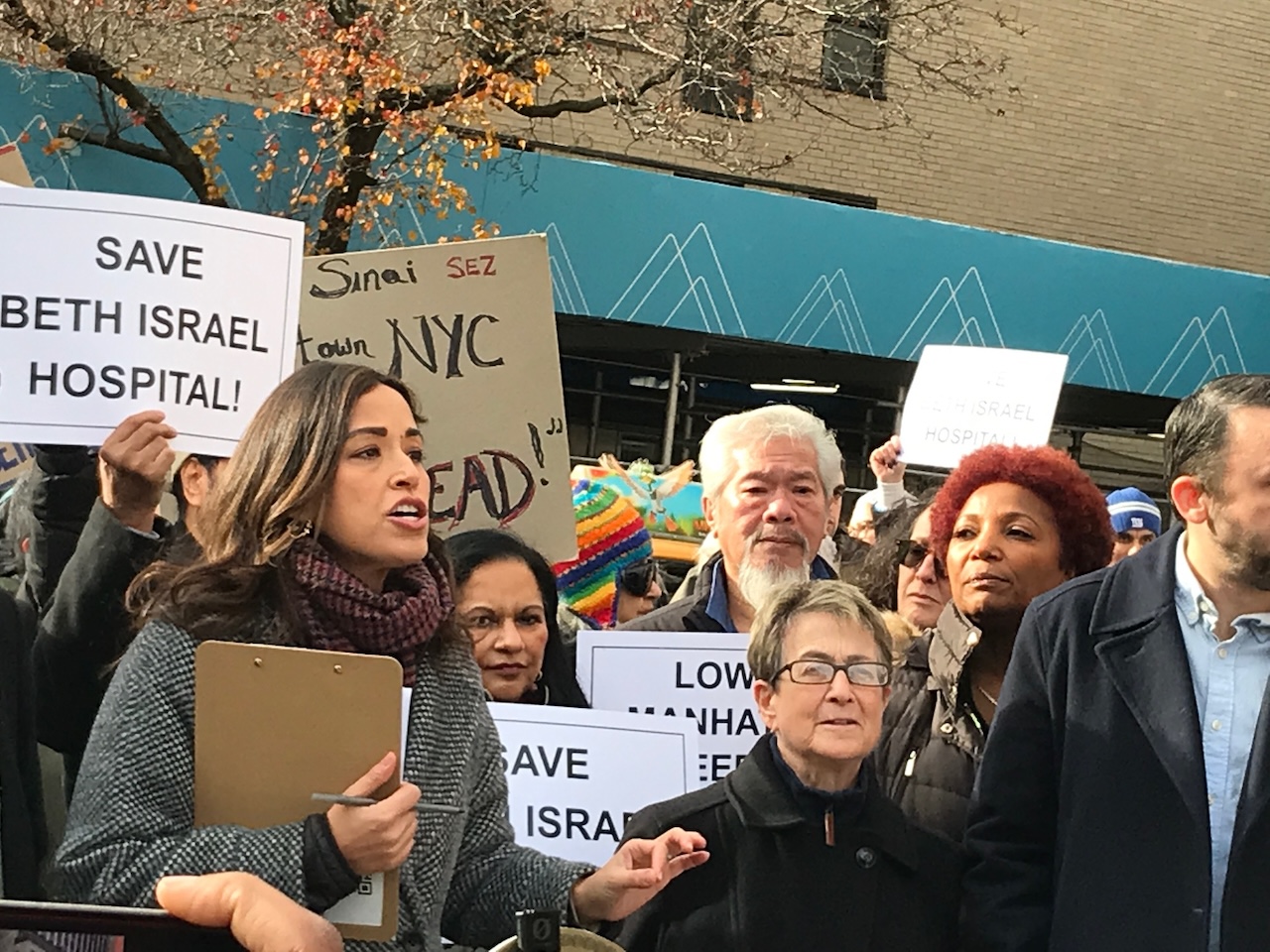BY PHYLLIS ECKHAUS | Hours before Brian G. Carr, Mount Sinai Health System’s C.E.O., gave the keynote at an event co-sponsored by healthcare finance professionals, the Save Beth Israel and New York Eye and Ear Campaign issued a scathing report accusing Mount Sinai of creating Beth Israel Medical Center’s debt through an 11-year campaign of conscious sabotage.
Jeannine Kiely, one of the report’s authors, told The Village Sun, “After its 2013 acquisition of Beth Israel, Mount Sinai intentionally dismantled Beth Israel’s inpatient services — decertifying nearly 200 licensed beds and services, including cardiac surgery and maternity. As a result, patients needing these services moved to other hospitals and Beth Israel’s operating revenue declined, driven by Mount Sinai’s operational decisions.”
The report was released early on June 13, before a healthcare summit at the New York Hilton Midtown, co-sponsored by Crain’s New York Business and the Metropolitan New York Chapter of the Healthcare Financial Management Association.
Prepared by the campaign’s financial analysis workgroup, the “Report From the Community” contends that Mount Sinai took Beth Israel, a once-profitable and highly regarded hospital, and methodically stripped it of the departments and services that had previously attracted money and patients.

This was made possible, the report says, because Mount Sinai disbanded and supplanted Beth Israel’s independent governing board. Thus, according to the campaign, no one independently represented the needs of Beth Israel “to fulfill its legal charitable mission to serve its Lower Manhattan community.”
Among the services moved from Beth Israel and transferred either to Mount Sinai Hospital or Mount Sinai West (the former Roosevelt Hospital) were cardiac surgery, maternity, neonatal care, pediatrics, chemical dependency and rehabilitation.
A stark chart in the report shows Beth Israel’s “operating net income” (total operating revenues minus total operating expenses) as being consistently robust for the seven years from 2006 through 2012, then dropping precipitously as Mount Sinai transferred out departments and decertified beds.
The campaign claims Mount Sinai further undermined Beth Israel’s finances by shifting lucrative medical practices off the hospital’s books. The Beth Israel Faculty Practice Plan, which had generated $174 million in revenue in 2013 alone, was merged into Mount Sinai’s Icahn School of Medicine in 2014 and 2015. Physician billing, which had provided an additional $19 million in 2013, was also moved. The Clinical Outreach Lab, which had generated more than $30 million a year for the hospital, was sold.
Why would Mount Sinai deliberately sabotage Beth Israel? The report asserts that Mount Sinai stands to “benefit from the financial gain of closing [Beth Israel] by selling off its land to real estate developers for hundreds of millions of dollars.”
The campaign calls on the state Department of Health and state attorney general to hold Mount Sinai accountable, especially as the campaign says the hospital behemoth appears still to ignore both D.O.H. mandates to halt closure and a temporary restraining order, or T.R.O., against closure that advocates secured in state court.
For its part, a Mount Sinai spokesperson called the charge of ignoring the T.R.O. “entirely false,” adding that the idea that Mount Sinai disbanded Beth Israel’s independent board was “complete nonsense.”
The report also accuses Carr of lies and misrepresentation in his June 6 “Carr Talk” newsletter to employees. Labeled “false” are the C.E.O.’s claims that Mount Sinai has been collaborating with the Beth Israel community and key partners to address community needs post-closure.

The campaign condemns as “misleading” Carr’s downplaying of the need for emergency services in Lower Manhattan. Carr asserts that today most Beth Israel ER patients don’t require emergency services. However, the report contends that such a pattern is true for many hospitals treating underserved and vulnerable patients — and is especially true for Beth Israel today, given that the hospital has been systematically rerouting patients with emergency needs to other hospitals.
In May, Mount Sinai submitted a revised Beth Israel closure plan to D.O.H., claiming unsustainable financial losses and insisting on a July 12 closure date. As of this writing, D.O.H. has not responded. However, a Crain’s New York article, behind a paywall, on the June 13 health summit reported that Carr stated at the forum that the July 12 closure date may no longer be plausible.
However, a Mount Sinai spokesperson scoffed at the report, saying it just feeds into the ongoing “conspiracy theory” around Beth Israel.
“These accusations are patently false and part of the larger conspiracy theory that some in the community have pushed for almost a decade now,” Loren Riegelhaupt said. “The truth is, in 2015, the year prior to moving any services, MSBI lost approximately $114 million and in 2016 MSBI lost approximately $86 million. More than eight years ago, Mount Sinai moved a few specialized services out of MSBI due to low patient volumes and the inherent risk to patient safety. We started moving those services in 2016 to other Mount Sinai hospitals that specialize in that type of care to ensure the best quality care for our patients, which was vetted and approved by the D.O.H. at the time. Any suggestion or conspiracy theory that suggests otherwise is simply false.”
Riegelhaupt added that the health system had poured a huge amount of funding into the hospital to try to keep it afloat, to no avail.
“Despite investing hundreds of millions of dollars to support and enhance the hospital in the past decade, M.S.B.I. has lost over $1 billion,” he said. “These continued and growing losses pose an existential threat to the viability of the overall [Mt. Sinai healthcare] system.”
The spokesperson added that, after the decision was made to close the historic Gramercy hospital, “Our goal from day one was to ensure a seamless and safe closure of M.S.B.I. for our patients and local community, and that remains the top priority today.”
The report, however, says Mount Sinai’s claim of investment in Beth Israel is misleading, “as much of the money went to Mount Sinai-Union Square,” Mount Sinai’s ambulatory care center, and not to the main Beth Israel campus, which, the report contends, “has suffered from disinvestment and the removal of profitable services.”


I lost my job when Sinai closed our cardiac surgery program. They did not help any of us retain our job titles or seniority. Our Cardiac Surgery program had excellent results and was thriving when Mount Sinai took over. Within one year of them revamping and hiring new surgeons and changing our ICU, the level of care diminished greatly. I saw people die that would not have under Beth Israel docs. It was a great place to work and our patients loved us. Mount Sinai destroyed Beth Israel. I saw it firsthand. I’d love my job back. How can we reopen Beth Israel?
Thank you for keeping attention on this story. The monetization of healthcare is one of the most destabilizing and frightening aspects of our current lives and must be called out forcefully. Reporting like this is crucial.
Excellent article. I thought the same thing, that they bought that property knowing they would close the hospital and then turn around and sell property to developers. They had no intention of keeping the hospitals there. It was all smoke and mirrors.
Please keep that lawsuit going! Demand redress and lots of penalties! I hate to see this stuff happen over and over again.
Excellent article, Phyllis. Have any of the elected officials mentioned creating a possibility of NY State buying the hospital? Or negotiating with Lenox Hill Hospital, which is trying to expand?
Thanks, Allie. Not that I’m aware of.
While I don’t doubt the greed that has infected our entire healthcare “industry,” the fact remains that Beth Israel has been a terrible hospital for long before Mt. Sinai took it over. I’ve had a number of friends die there who didn’t look (to my untrained eye) all that sick when they went in. Even a nurse who worked there (pre-Mt. Sinai) confided to me that it was an awful hospital. I’m not sure its demise is such a loss to community medicine.
Mt. Sinai is an awful example of hospital bad behavior. I tried for 3 months to get a dr’s appt, an impossible merry-go-round. I was given dozens of wrong phone numbers, employees not answering their phones, multiple contradicting answers to requirements needed for appointments. I finally got a patient advocate, whose excuse was “We are implementing new systems at the hospital”…new phone lines, etc.
A friend of mine at The New York Times implied that this state of affairs mirrors what happed to St. Vincent’s Hospital.
Excellent article!
Mt. Sinai continues in an ignominious pattern established by Beth Israel. In its attempt to buy the property at 344 E. 14th St. occupied by the 14th St. Y back around 1990, BI paid $1 million under the table to the UJA. The community rallied to preserve the facility. The office of the NYS Attorney General saw a pattern of corruption and told the UJA unless they kept the Y open, the AG would “start an investigation.” $7 million and two years later, the Y reopened after
renovations to correct structural defects and improvements. That was a better deal than having a scandal expose pattern and practice and having the UJA suffer a big dent in the fundraising.
I had a friend who had been treated over time for a heart condition at BI Union Square. Last fall he was scheduled for another procedure. He asked me to pick him up. He was moved to Mt. Sinai Uptown because, he said, “The robots were more precise” than the human surgical hand. Things did not go well. Many could not visit. He died after weeks in intensive care. He might have passed away anyhow. But it is clear he was a casualty of greed.
Mount Sinai is guilty of putting thousands of lives on the line due to their negligence in deliberately dismantling Beth Israel.
Thanks for the continued report about the big loss it will be for our community!
Nothing Greater than the Truth!!
Hope our community will be able to overcome big business at the cost of our health needs.
Excellent report from Phyllis Eckhaus. Thanks, Phyllis, for keeping us updated on this heinous story.